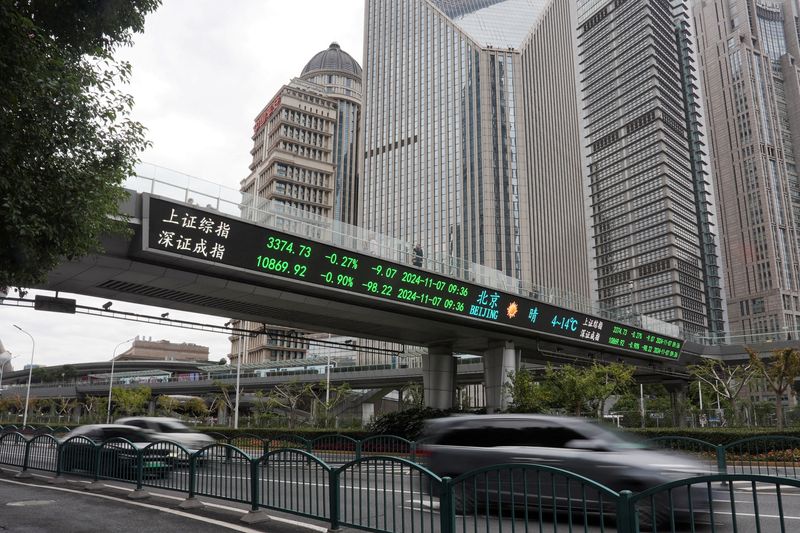SHANGHAI/HONG KONG (Reuters) -China announced plans on Thursday to channel hundreds of billions of yuan of investment from state-owned insurers into shares as part of the government's latest efforts to support a struggling stock market.
The plan by the country's six financial regulators including the securities regulator was first announced on Wednesday just as Donald Trump begins a second stint as U.S. President.
Coming soon after Trump's threat to slap a 10% punitive duty on Chinese imports, the coordinated moves underlined Beijing's intent to prop up markets in what could be a fractious geopolitical setting.
The new measures, spanning higher investments by insurers and mutual funds, lower fees and other corporate reform initiatives, are also the latest in a slew of steps authorities have taken since last September to revive the stock market, with limited success.
Stocks rose after the press conference by China Securities Regulatory Commission (CSRC) head Wu Qing, but gains were modest.
The CSI300 blue-chip index was last up 0.2% while the Shanghai Composite Index jumped 0.6%. Hong Kong's Hang Seng Index pared early gains to be down 0.6%.
A gauge tracking insurers jumped 3.3%, and China Life Insurance (NSE:LIFI) rallied 4.8%.
The latest plan mirrors previous calls to promote capital markets, said Ben Bennett, Asia-Pacific investment strategist at Legal And General Investment Management.
"It's not a big surprise, but nice to see some tangible policies. These things need to go hand in hand with stronger growth and earnings expectations to be fully effective."
CSRC chief Wu said authorities will call on insurers to invest at least 100 billion yuan ($13.75 billion) of long-term funds into stocks in the first half of this year.
The regulators will encourage big state insurers to invest 30% of new annual premiums in A-shares, and encourage mutual funds to increase their A-share holdings' tradable market value by at least 10% annually over the next three years, Wu said.
"Medium- and long-term funds play a crucial role in the capital market as professional investors. They act as the 'ballast' and 'stabilizer' to ensure the market runs smoothly and remains healthy," he said.
These measures will channel "several hundred billion" into onshore stocks every year, and consolidate the positive trend of the capital market, he added.
The plan also involves guiding mutual fund managers to increase investments in their own equity products, cut fund sales fees and promote the development of exchange-traded fund products.
Beijing has been intensifying policy support to prop up the stock market, which has been weighed down heavily by a long-running property crisis, deflationary pressure and geopolitical tension.
Authorities introduced swap and re-lending schemes totalling 800 billion yuan for stock purchases in September as well as guidelines on market capitalisation management to encourage companies to improve shareholder returns.

Stock prices have been highly volatile since authorities signalled support in September. The benchmark stock index CSI 300 surged 40% in the two weeks after that first stimulus announcement but disappointment with the degree and pace of implementation has seen the CSI 300 index halve that gain since.
($1 = 7.2728 Chinese yuan)